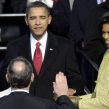
Obama Brings New Hopes for Turkey
Publication: Eurasia Daily Monitor Volume: 6 Issue: 13
By:

President Barack Obama’s inaugural address has been warmly welcomed by the Turkish media. Three of his statements have been commonly praised by the Turkish press: his warm message to the Muslim world, the virtue of democracy, and hope for the future. The liberal daily Radikal ran the headline “Virtue of Democracy”; the Center-Right Milliyet announced “A New World”; and the Center-Right Hurriyet’s headline was “Our Hope Is Obama.” The Center-Left Sabah’s banner was “We Are a Friend of the World.” The Islamist Yeni Safak used Obama’s message to the Muslim world, “Extend Your Hand” for its headline, while Zaman pronounced “A New Beginning Full of Hope.”
Almost all of the newspapers stressed the following paragraph from Obama’s Inaugural address:
To the Muslim world, we seek a new way forward, based on mutual interest and mutual respect. To those leaders around the globe who seek to sow conflict or blame their society’s ills on the West: Know that your people will judge you on what you can build, not what you destroy. To those who cling to power through corruption and deceit and the silencing of dissent, know that you are on the wrong side of history but that we will extend a hand if you are willing to unclench your fist (www.cnn.com, January 20).
Obama’s message to the Islamic world was welcomed. Editorial analyses of the substance of the speech have not yet appeared in the Turkish press, but comments in Internet blogs warmly praised Obama’s words. Very few of the 116 messages in an Internet blog were negative. Some of the people were praying for Obama (“May Allah not embarrasses you”); and one said, “he gave a very positive message. My gut feeling tells me that this guy will deliver on what he says.” “I hope you will not turn into another Bush,” another blogger wrote. Still another said, “I am deeply touched by his speech and message. May God help Obama. Our prayers are with him, because he is not only the hope of America but the hope of all people” (www.haberturk.com, January 21). Some 80 percent of Turks were anti-American before this, but enthusiasm like this indicates that people are ready to forget what the Bush administration did in the Middle East and want to open a new chapter of relations with the Obama administration.
Columnists in Turkish newspapers take a positive view of Obama but also question whether he will actually be able to deliver on his promises. Beril Dedeoglu of Star, for instance, argues that Obama’s policies call for sharing responsibilities with the international community. This policy can only be implemented if all players share accountability. In short, the United States outlined a model of cooperation and expects others to go along with it. If international players accept his plan there will be no problem…but if they do not? In this case, it appears that the United States will continue to punish those who damage the harmony of the American-led international cooperation (Star, January 21).
Soli Ozel of Sabah cited Obama’s speech and interpreted it as a sign of change. Obama’s statement that “as for our common defense, we reject as false the choice between our safety and our ideals” showed that he has a different approach from that of his predecessor Bush, Ozel said. In addition, “by emphasizing ‘our power alone cannot protect us, nor does it entitle us to do as we please,’ Obama rejected neo-con, foreign policy principles. If Obama can keep his promises he will change not only his own country but also the rest of the world. I hope he can do it” (Sabah, January 21).
Cengiz Candar of Radikal is the most optimistic policy analyst. He thinks that “by electing Obama as President, the most powerful country in the world showed its capacity to change. It will initiate a momentum of change. After this, it will be very difficult to maintain those fossilized political structures and fossilized politicians in power” (Radikal, January 21).
Cuneyt Ulsever of Hurriyet does not agree with the optimist commentators, claiming that Obama simply cannot pursue his plans for change but will be a realist and will maintain the United States’ position as a superpower. According to Ulsever, Obama’s policy preferences will be tested in his Middle East policies. How fast will he withdraw American troops from Iraq? While withdrawing his troops, how will he shape the new balance in Iraq? Will he accept the reality of the Taliban in Afghanistan and the fact that it is not possible to control Afghanistan without establishing cooperation with the Taliban? Will he negotiate with Iran and convince it to stop enriching uranium? How will he position himself toward Hamas and Hezbollah? Will he continue to work with American-friendly Arab dictators, or will he endorse democracy in the Arab world? (Hurriyet, January 21).
In addition to the media’s optimism, Prime Minister Recep Tayyip Erdogan expects Obama to “be the defender of those who have no defender and the voice of those who have no voice” (Star, January 21).
It seems that with Barack Obama, amost everyone, from the prime minister down to the man in the street, is ready to open a new chapter in Turkish-U.S. relations. They do, however, have some concerns as well. They want to know how he will handle the Armenian claims of genocide and whether he will continue to support Turkish efforts to curb Kurdish separatist terror activities. Given the fact that Obama’s inaugural messages were warmly welcomed in a Muslim country like Turkey, where anti-Americanism was on the rise, it would perhaps be a wise step for Obama to visit Turkey in his early days in office to reinforce his positive position toward the Muslim world.




